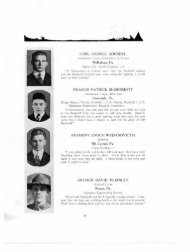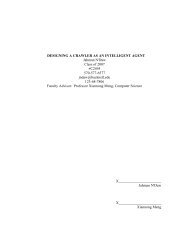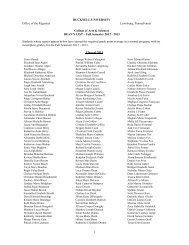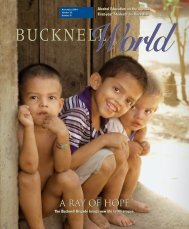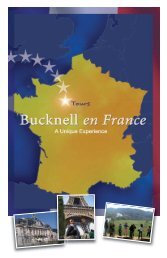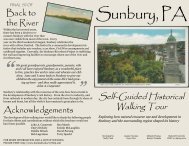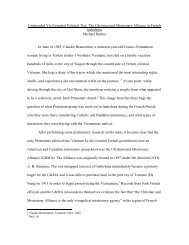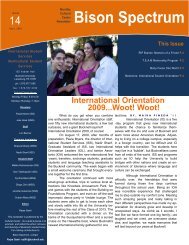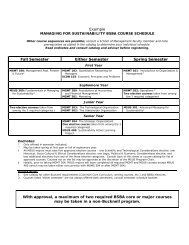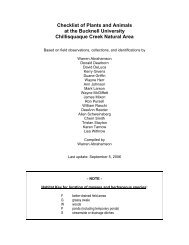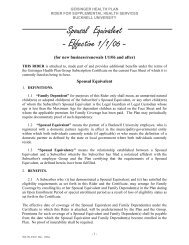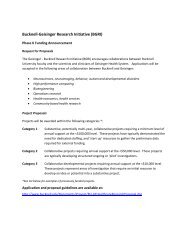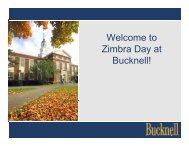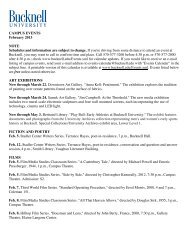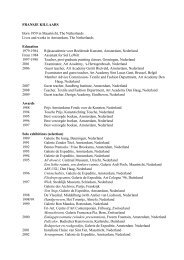World - Bucknell University
World - Bucknell University
World - Bucknell University
You also want an ePaper? Increase the reach of your titles
YUMPU automatically turns print PDFs into web optimized ePapers that Google loves.
September 2006<br />
Volume 34<br />
Number 4<br />
BUCKNELL<br />
<strong>World</strong><br />
The Ripple Ripple Effect<br />
Effect
President’s Message<br />
John Gardner<br />
High and Worthy Expectations<br />
We begin the 2006–07<br />
academic year with an<br />
approved strategic plan —<br />
The Plan for <strong>Bucknell</strong>.<br />
Thousands of you have<br />
provided your feedback on<br />
the process and informed<br />
the content of The Plan. I<br />
remain grateful for your<br />
commitment to <strong>Bucknell</strong>’s<br />
future.<br />
As we implement The<br />
Plan, our faculty, staff, and<br />
students will develop and<br />
shape ideas focused on<br />
achieving the goals it lays out for the <strong>University</strong>. Our<br />
new Office of Strategy Implementation, under the<br />
direction of Mark Dillard, will centralize and focus<br />
the prioritization and implementation of these ideas.<br />
As energized as the campus is to take the next steps,<br />
we must be measured in our approach. Good ideas<br />
are plentiful; human, fiscal, technological, and space<br />
resources are not. Generating and implementing<br />
tactics will be an iterative process: We will act<br />
upon proposals best aligned with The Plan and<br />
for which resources are available and then, as those<br />
tactics are implemented, turn our attention toward<br />
new proposals.<br />
The process of building The Plan afforded<br />
Maryjane and me the opportunity to travel extensively<br />
to meet <strong>Bucknell</strong>ians, near and far.<br />
Throughout numerous trips, we heard why people<br />
love <strong>Bucknell</strong>. Our alumni have great memories of<br />
friends, professors, and experiences that have<br />
helped them personally and professionally. These<br />
visits also gave us an opportunity to learn more from<br />
alumni about issues that have splintered <strong>Bucknell</strong>’s<br />
alumni population over the last decade. I have tried<br />
to address these matters directly, with a focus on<br />
creating solutions rather than dwelling on the past.<br />
I enjoy participating in these candid discussions and<br />
appreciate the willingness of alumni to share ideas<br />
openly and with the great passion and respect for<br />
<strong>Bucknell</strong> that binds all our alumni.<br />
Back on campus, the new academic year will be<br />
marked by significant organizational changes in<br />
Academic Affairs and Student Affairs. Under the<br />
direction of Provost Mary DeCredico ’81, this<br />
restructuring will create a formal alignment of<br />
<strong>Bucknell</strong>’s residential environment so that learning<br />
and living are not separate endeavors. Operating<br />
with the same principle of alignment and efficiency,<br />
our admissions, financial aid, and registrar’s offices<br />
have been brought together more concretely to<br />
meet the needs of our prospective and current<br />
students. In particular, we are exploring making<br />
enrollment services a single organizational unit,<br />
using models at other excellent institutions, such as<br />
the <strong>University</strong> of Pennsylvania.<br />
We are in the process of making administrative<br />
changes in the area of Enrollment Management.<br />
2 BUCKNELL WORLD • September 2006<br />
BRIAN C. MITCHELL<br />
Optimizing Mark Davies’ many years of experience<br />
at <strong>Bucknell</strong>, we have appointed him assistant<br />
vice president. Mark will manage a number of key<br />
strategic projects for the division, including Posse,<br />
a national college-access and leadership program that<br />
identifies, recruits, and trains outstanding young<br />
leaders from public schools in urban areas (see cover<br />
story on p. 10), and the Jack Kent Cooke Foundation<br />
community college transfer program. We are building<br />
a new admissions and enrollment paradigm —<br />
one that focuses on building and strengthening<br />
our relationship with students — under the direction<br />
of Kurt Thiede, Vice President for Enrollment<br />
Management and Dean of Admissions. Along with his<br />
responsibility for the strategic vision of these areas,<br />
Kurt will be much more actively involved in the<br />
division’s day-to-day operations.<br />
The merger of Academic Affairs and Student<br />
Affairs also has opened the door for <strong>Bucknell</strong> to<br />
begin a formal, concerted external affairs effort<br />
under the direction of Vice President for External<br />
Relations Charlie Pollock ’70. <strong>Bucknell</strong> enjoys<br />
positive relationships with the local community as<br />
well as state and federal governments and has<br />
opportunities to develop those relationships to even<br />
better advantage. Charlie has been <strong>Bucknell</strong>’s liaison<br />
to the community for the past eight years and had<br />
extensive experience in external and community<br />
relations before returning to <strong>Bucknell</strong>. Formalizing<br />
his leadership role in achieving this objective was<br />
a logical strategic move. Charlie will also have additional<br />
responsibilities at the state and federal level<br />
and in local and regional economic development.<br />
Under the direction of our Chief Communications<br />
Officer, Pete Mackey, we also have been<br />
reorganizing certain staff to improve <strong>Bucknell</strong>’s<br />
communications and marketing abilities and the<br />
service this staff can offer across campus. We are in<br />
the process of initiating an outside review of<br />
<strong>Bucknell</strong>’s image and marketing opportunities with<br />
the same general goal — to enhance and refine our<br />
operations for the long-term benefit of <strong>Bucknell</strong><br />
and its students, faculty, and alumni.<br />
Finally, we continue planning for the comprehensive<br />
campaign with the guidance of our recently<br />
selected campaign consultants, Grenzenbach, Glier,<br />
and Associates. I expect we may well begin the silent<br />
phase of the campaign in the summer of 2007.<br />
The Class of 2010, as did those that preceded it,<br />
will enter <strong>Bucknell</strong> with outstanding credentials and<br />
promise and a great desire to become full-fledged<br />
<strong>Bucknell</strong>ians. For some of them, summer will have<br />
included already such <strong>Bucknell</strong> traditions as Bison<br />
Gatherings, Buckwild, or Building on Foundations.<br />
Maryjane and I look forward to getting to know our<br />
newest class.<br />
Perhaps the best word to describe this progress<br />
is momentum. We will continue to steward this<br />
momentum as The Plan for <strong>Bucknell</strong> goes into action<br />
and enables <strong>Bucknell</strong> to meet the high but worthy<br />
expectations we all have for this great <strong>University</strong>.<br />
BUCKNELL<br />
<strong>World</strong><br />
Executive Editor<br />
Pete Mackey<br />
Editor<br />
Gigi Marino<br />
Contributing Editors<br />
Sam Alcorn<br />
Jennifer Botchie<br />
Bob Gaines<br />
Kathryn Kopchik MA’89<br />
Ilene Ladd<br />
Class Notes Editor<br />
Jennifer Botchie<br />
Class Notes Editor Emerita<br />
Erma Gustafson<br />
Editorial Assistant<br />
Paula Bryden<br />
Art Director<br />
Ruta Karelis<br />
<strong>Bucknell</strong> <strong>World</strong> Webmaster<br />
Stephanie Zettlemoyer<br />
<strong>Bucknell</strong> <strong>World</strong> Intern<br />
Julia Lyons ’08<br />
Published by<br />
<strong>Bucknell</strong> <strong>University</strong><br />
<strong>Bucknell</strong> <strong>World</strong> (USPS 068-880,<br />
ISSN 1044-7563), copyright 2006,<br />
is published six times a year,<br />
in the months of January, April,<br />
June, September, October, and<br />
November, and is mailed without<br />
charge to alumni, parents, students,<br />
faculty, staff, and friends of<br />
<strong>Bucknell</strong> <strong>University</strong>.<br />
Periodicals postage paid at<br />
Lewisburg, PA 17837,<br />
and at additional entry offices.<br />
Circulation: 46,000. Address all<br />
correspondence to the editor.<br />
email: bworld@bucknell.edu<br />
<strong>Bucknell</strong> <strong>World</strong> website:<br />
www.bucknell.edu/<strong>Bucknell</strong><strong>World</strong><br />
Postmaster:<br />
Send all address changes to<br />
Editor, <strong>Bucknell</strong> <strong>World</strong>,<br />
Judd House, <strong>Bucknell</strong> <strong>University</strong>,<br />
Lewisburg, PA 17837<br />
Telephone: 570-577-3260<br />
Fax: 570-577-3683<br />
<strong>Bucknell</strong> <strong>World</strong><br />
is printed on recycled paper<br />
and is recyclable.<br />
Cover Photo: Gene Maylock
Inside this issue<br />
FEATURES<br />
10 THE POSSE PERSPECTIVE<br />
Meet the <strong>Bucknell</strong> Posse — a group of 10 dynamic and motivated<br />
students chosen from more than 600 students in the Washington,<br />
D.C, area to attend <strong>Bucknell</strong>; they spent eight months together<br />
preparing for their college venture. — Christina Masciere<br />
Wallace<br />
14 REUNION 2006<br />
More than 2,000 alumni and their families returned to <strong>Bucknell</strong><br />
June 1–4 for Reunion, enjoying fireworks, alumni colleges, class<br />
dinners, tent parties, children’s activities, concerts, and seeing old<br />
friends in a familiar and beloved place.<br />
16 BOOKS FOR A POST–SEPTEMBER 11<br />
WORLD<br />
Philip Roth ’54 addresses death in his 27th novel. Matthew<br />
Bogdanos ’80 chases stolen antiquities in Iraq. Janet Powers ’61<br />
makes a case for peace between Israeli and Palestinian women.<br />
Scientist Glen McLaughlin ’77 becomes a poet. — Claudia Ebeling<br />
DEPARTMENTS<br />
2 President’s Message<br />
4 Letters<br />
5 <strong>Bucknell</strong> Express<br />
19 Alumni Association<br />
New career services for alumni.<br />
20 Class Notes<br />
Alumni Profiles: Jim Vicevich ’74, p. 31 • Greg Schiano<br />
’88, p. 34 • Audra Wilson ’94, p. 36<br />
28 Flashback — 1969<br />
Back of the Class.<br />
40 <strong>World</strong>’s End<br />
A Nobel night.<br />
Terry Wild<br />
Books<br />
<strong>Bucknell</strong> authors have been busy.<br />
Page 16<br />
Gene Maylock<br />
“LET’S RIPPLE”<br />
S E P T E M B E R 2 0 0 6<br />
Focusing on leadership and communication,<br />
<strong>Bucknell</strong>’s Posse 1 is determined to have a<br />
ripple effect on the campus community.<br />
Page 10<br />
BUCKNELL<br />
COMING HOME TO BUCKNELL<br />
Reunion 2006 drew a huge and happy crowd.<br />
Page 14<br />
September 2006 • BUCKNELL WORLD 3
Readers Write<br />
Letters<br />
Editor’s Note: We encourage letters to the editor related to topics discussed in the<br />
most recent issue of <strong>Bucknell</strong> <strong>World</strong>, matters that relate to university news or policies,<br />
or that are of interest to a segment of our readership. Letters should be no<br />
longer than 300 words and may be edited for length, clarity, and civility. Letters<br />
can be mailed, faxed, or sent via email to bworld@bucknell.edu. Letters received<br />
between now and Sept. 15 will be considered for the November issue. Additional<br />
letters will be posted on the <strong>Bucknell</strong> <strong>World</strong> website. The complete letters policy can<br />
be read at www.bucknell.edu/<strong>Bucknell</strong><strong>World</strong>.<br />
MORE TO SAY<br />
At Reunion Rally, I was one of<br />
six members from the Class of<br />
1956 to receive the Alumni<br />
Association’s “Loyalty to <strong>Bucknell</strong>”<br />
award. Each of us was deeply moved<br />
by the honor, but it was correctly suggested<br />
that we keep our acceptance<br />
speeches short. Anyone who knows<br />
me must have been stunned that I<br />
actually did what I was told and spoke<br />
for about 90 seconds, with a couple of<br />
anecdotes and a heartfelt thank you.<br />
I have more to say.<br />
In my haste to break my all-time<br />
record for keeping quiet, I accidentally<br />
left out what I really wanted to say to<br />
that great gathering of classes at the<br />
Weis Center. First, there is no greater<br />
place on earth than the <strong>Bucknell</strong> I<br />
attended in the 1950s … unless it<br />
would be the <strong>Bucknell</strong> of today.<br />
Through all these years, I have<br />
remained close to the <strong>University</strong><br />
because I strongly believe that higher<br />
education is one of the most critical<br />
elements of a free society. I also cannot<br />
imagine what my life would be like<br />
without <strong>Bucknell</strong>.<br />
<strong>Bucknell</strong> has always been special<br />
to my classmates and me. What we<br />
have seen over the 50 years since graduation<br />
is a phenomenal metamorphosis<br />
from a small, rural institution to one<br />
of the finest and most respected universities<br />
in the nation. I believe this is a<br />
decisive period in the history of our<br />
<strong>University</strong> and that the next 5–10 years<br />
will be incredibly dynamic. The Plan for<br />
<strong>Bucknell</strong> accurately addresses our<br />
strengths and aspirations. We have<br />
everything in place to move our<br />
<strong>University</strong> to the pinnacle of greatness.<br />
Furthermore, we have a powerful and<br />
passionate administration — led by<br />
President Mitchell and Provost<br />
DeCredico — determined to take us to<br />
that next level.<br />
From what I saw at Reunion, the<br />
alumni are ready, willing, and anxious<br />
to join this great venture. Speaking for<br />
the Class of 1956, I believe each of us<br />
cherishes the feeling we get every time<br />
we return to campus and the pride we<br />
share in being <strong>Bucknell</strong>ians. It has<br />
been an amazing journey. And I’ll<br />
guarantee that when the members of<br />
the Class of 2006 return for their 50th<br />
Reunion, they also will look back in<br />
amazement.<br />
Art Kinney ’56<br />
Lake Barrington Shore, Ill.<br />
4 BUCKNELL WORLD • September 2006<br />
THE GREEK<br />
CONNECTION<br />
The Alumni Association News<br />
section in the June 2006<br />
issue, titled “<strong>Bucknell</strong> Friends<br />
Forever,” was very interesting. You<br />
made note of how fraternity and sorority<br />
alumni have kept in close contact with<br />
their brothers and sisters through the<br />
years after their graduation. I know<br />
from my own experience that I get<br />
together with my own fraternity brothers<br />
much more frequently than I do with<br />
fellow classmates with whom I resided<br />
as a freshman or sophomore. I have<br />
much more in common with my<br />
fraternity brothers. I was a chemistry/<br />
economics major and have not seen<br />
any classmates since graduation except<br />
my fraternity brothers or members of<br />
other fraternities I associated with<br />
socially. I even spend time with fellow<br />
brothers who did not attend <strong>Bucknell</strong><br />
until after I had graduated.<br />
Additionally, in the same issue,<br />
Bob McKernan’s ’48 letter titled “Greek<br />
for Life” expresses the same thoughts.<br />
Greek life just made college more<br />
enjoyable by teaching us how to grow<br />
and not just hit the books and study, as<br />
we did when getting our MBA degrees,<br />
when our only association with other<br />
students was in class or the library.<br />
James Hurtt ’52<br />
Stuart, Fla.<br />
MAKE A SPACE<br />
FOR ART<br />
This letter is a follow-up to<br />
Richard Zandler’s ’73 letter,<br />
“Campaigning for the Arts,” in<br />
the April issue.<br />
<strong>Bucknell</strong> has a proud tradition as<br />
a leading liberal arts university,<br />
providing an environment that fosters<br />
development of each individual’s<br />
critical intellect, as well as social and<br />
historical awareness. We, the undersigned<br />
alumni, each a former graduate<br />
assistant in sculpture, have used our<br />
<strong>Bucknell</strong> experience to pursue careers<br />
in the visual arts. As devoted advocates<br />
of the importance of arts learning, we<br />
know that the physical environment<br />
for visual arts at <strong>Bucknell</strong> is scattered<br />
across campus, has not improved much<br />
over the years, and is so inadequate<br />
that a new facility is certainly needed.<br />
A comparison to <strong>Bucknell</strong>’s<br />
“frame of reference” schools reveals<br />
the following:<br />
• Lafayette College boasts the<br />
23,500 square-foot Williams Visual<br />
Arts Building, which opened in 2001,<br />
and “is one of the leading high-tech<br />
facilities for art education and exhibitions<br />
in the nation.”<br />
• Colgate has the architecturally<br />
distinguished new Schupf Studio<br />
Building, providing studio spaces for<br />
advanced students and faculty and two<br />
teaching galleries.<br />
• Skidmore features the Tang<br />
Teaching Museum and Art Gallery,<br />
“nationally known for both its architecture<br />
and its holdings.”<br />
The complexities and variety of<br />
teaching in the creative arts requires<br />
space beyond that of typical classrooms.<br />
A new dedicated facility at a<br />
single site would vastly improve the<br />
learning context of the visual arts,<br />
enabling art faculty and students<br />
to achieve a broader and deeper<br />
coherence and resonance in their<br />
creative experiences while furthering<br />
<strong>Bucknell</strong>’s fine reputation as a leader in<br />
liberal arts education.<br />
Bruce Lindsay ’83<br />
Yardley, Pa.<br />
Other signees include Allen C. Topolski ’86,<br />
David Marshall ’75, Peter Bevis ’75,<br />
Richard Zandler ’73, Georgia Gerber ’77,<br />
William H. Bennett ’70, and Eric Troffkin.<br />
SPEAKING OF<br />
MUSIC ...<br />
Ivery much enjoyed “The Singing<br />
College” [April 2006], but I think<br />
the writer short-changed Paul<br />
Stoltz a bit. He was not the head of the<br />
music department from 1908–13 but<br />
from 1908–48. It was he who brought<br />
Melvin Le Mon and William McRae<br />
to <strong>Bucknell</strong> along with other distinguished<br />
faculty members. He was<br />
instrumental in my changing to a<br />
music major in 1947.<br />
As I recall, somewhere back in the<br />
teens, the name was changed from the<br />
School of Music to the Department of<br />
Music. This could possibly account for<br />
the wrong dates in your story. When I<br />
graduated in 1949, the old house on<br />
Third Street was still labeled School of<br />
Music.<br />
In the fall of 1942, I was a freshman<br />
engineering student, but I played<br />
trumpet in the marching band. I heard<br />
older members of the band talk about<br />
Melvin Le Mon, and I got the impression<br />
that he left in the spring of 1942. I<br />
don’t remember ever seeing him, and<br />
Charles Stickney was the band director<br />
when I was a member.<br />
Speaking of Le Mon’s music, a<br />
few years before I retired from<br />
Chicago Musical College of Roosevelt<br />
<strong>University</strong> in 1986, while browsing<br />
through a secondhand music store, I<br />
found a spiral-bound manuscript copy<br />
of Le Mon’s folk opera, Down, Down,<br />
Down. He used the folk and work music<br />
of Pennsylvania anthracite miners as a<br />
basis for his opera. A handwritten preface<br />
states that all the research for it was<br />
done between 1933–39, which covered<br />
most of his time at <strong>Bucknell</strong>. The piece<br />
itself apparently was not completed<br />
until 1957. I have no idea if it was ever<br />
performed, but I still have the score.<br />
Cliff Reims ’49<br />
Fairhope, Alaska<br />
Editor’s Note: Bill Le Mon ’54, Melvin Le<br />
Mon’s son, responds. “Mr. Reims got most of<br />
his facts right. My father collected the songs<br />
of the coal miners while he was working on<br />
his Ph.D. at Eastland. His intention at the<br />
time was to get a record of the folk music,<br />
not write an opera, which he did not do<br />
until 1960. My father left <strong>Bucknell</strong> in 1943,<br />
and his opera was performed at Alfred<br />
<strong>University</strong> in 1964.”<br />
“Dear President Mitchell, I had planned to send you thought-provoking and<br />
probing feedback regarding The Plan for <strong>Bucknell</strong>. Unfortunately I am forced to<br />
send a check instead. I’ll try to do better next time.”
<strong>World</strong><br />
BUCKNELL Express<br />
<strong>Bucknell</strong> Sings<br />
William Payn directs the Rooke Chapel Choir in Poland this past spring.<br />
The sounds of <strong>Bucknell</strong> voices can<br />
be heard singing above the pews of Rooke Chapel,<br />
echoing in the balconies of the Weis Center, and<br />
reverberating in cathedrals throughout Eastern<br />
Europe. This past summer, the 38-member Rooke Chapel<br />
Choir marked two decades of spring concert performances<br />
with a four-city tour of the Czech Republic and Poland.<br />
William Payn, professor of music and director of choral<br />
studies, began the spring tour program in 1984, with a trip<br />
to England and Wales. Since then, the Choir’s travels have<br />
included Italy, Croatia, Costa Rica, Holland, West Germany,<br />
Belgium, Switzerland, and Austria.<br />
In each country it visits, the Choir performs at least<br />
one piece in the native language. Payn believes that the<br />
opportunity to perform a piece of music in the country in<br />
which it was first performed is invaluable. Emily Yoder ’06,<br />
one of two tour managers, agrees, “Singing in centuries-old<br />
cathedrals just does not compare to any other feeling in the<br />
world. The music seems more alive in those spaces — as if<br />
it were written to be sung there.” The tour is more than an<br />
educational experience for the students, says Payn. “Not<br />
only do they sing together, but they play together — they<br />
develop a lot of camaraderie. When they come back in the<br />
fall, I feel a real energy in the ensemble.”<br />
The Rooke Chapel Choir is not the only vocal group<br />
from <strong>Bucknell</strong> that travels beyond Central Pennsylvania.<br />
The 75-member Concert Chorale has toured the Pacific<br />
Northwest, Arizona, Florida, and Massachusetts. While the<br />
Chapel Choir sings exclusively sacred music, the Concert<br />
Chorale performs a wider range, including classic, jazz, pop,<br />
and Broadway tunes. The Chorale has performed with the<br />
National Symphony Orchestra; the Chorale of Simon<br />
Bolivar of Caracas, Venezuela; the Pennsylvania Ballet; the<br />
Baltimore Symphony Orchestra; and Solid Brass, one of<br />
this past year’s Weis Center Series performers.<br />
Last year, for the first time ever, the Concert Chorale<br />
joined with all of the a cappella groups on campus for a<br />
performance of pop and jazz favorites titled “’Ray <strong>Bucknell</strong>.”<br />
Joining the Chorale were the all-male group, The Bison<br />
Chips; the all-female group, The Silhouettes; and the<br />
coed student a cappella groups, Beyond Unison and Two<br />
Past Midnight.<br />
The Concert Chorale will dedicate its fall concert to<br />
its founder, Allen Flock, who died this past spring. Flock<br />
taught at <strong>Bucknell</strong> for more than 30 years. His longevity in<br />
teaching is a common trait in <strong>Bucknell</strong>’s music department.<br />
William McRae, founder of the Chapel Choir, served as a<br />
professor for 43 years from 1936–79. Current faculty<br />
members Jackson Hill and William Duckworth have worked<br />
at <strong>Bucknell</strong> for 38 and 33 years, respectively. Payn himself<br />
arrived at <strong>Bucknell</strong> 24 years ago. “I thought I might stay<br />
for four or five years and then go to a conservatory,” says<br />
Payn. “I had opportunities to do that, but I turned them<br />
down, because I really believe in this institution because it<br />
is such a singing institution.”<br />
The number of singing opportunities available serves as<br />
a draw to prospective students. Besides the Concert Chorale,<br />
Rooke Chapel Choir, and the four student a cappella<br />
groups, students also can sing with the <strong>Bucknell</strong> Opera<br />
Company, which performs at <strong>Bucknell</strong> and travels the<br />
region performing for school groups, or the Voices of Praise<br />
Gospel Choir, a student organization that sings contemporary<br />
Christian music on Sundays when the Chapel Choir<br />
is not performing.<br />
“Students really benefit from participation in any<br />
ensemble,” says Payn. “They learn dedication, cooperation,<br />
responsibility, and the joy of one common passion.”<br />
— Ilene Ladd<br />
September 2006 • BUCKNELL WORLD 5
RESEARCH & TEACHING<br />
Making a Better Bot<br />
’RAY BUCKNELL<br />
6 BUCKNELL WORLD • September 2006<br />
The Plan for <strong>Bucknell</strong> calls for<br />
building bridges to the world. Mechanical engineering<br />
professor Keith Buffinton is doing just<br />
that by involving students in real-world research.<br />
Buffinton oversees the Pulse Width Control (PWC)<br />
Project with his colleague, <strong>University</strong> of Washington associate<br />
professor Martin Berg. Funded by the National Science<br />
Foundation, the project is involved with developing precise<br />
control of robotic devices.<br />
As demands increase for finer and finer scale movements,<br />
friction presents a serious challenge to robotics.<br />
“When you’re trying to do really small maneuvers, even<br />
small amounts of friction can cause you not to reach your<br />
goal,” Buffinton says.<br />
Countless variables affect friction, making it difficult<br />
to predict how much force is needed to move a robot arm<br />
precisely to the spot where it has a job to do.<br />
Pulse Width Control offers a way to deal with the<br />
uncertainty of friction. Rather than pushing a robot arm<br />
along until it reaches its destination, a series of pulses are<br />
given to the robot, like giving a coffee mug a push across a<br />
table and then waiting to see where it comes to rest. If the<br />
mug — or robot arm — doesn’t end up where you want it,<br />
then another push is given. The key is for each push to be<br />
just strong enough to overcome friction.<br />
The PWC project is an outgrowth of work that<br />
Buffinton and Berg did on a large robot used by the Boeing<br />
Company in Seattle to construct airplanes. The real-world<br />
application gave them an opportunity to test their ideas.<br />
“It was a way for us to demonstrate that the idea, the<br />
concept, the theory really worked with a real robot,”<br />
Buffinton says. “Now we’re trying to take the same idea<br />
and expand it for different types of applications, for different<br />
types of robots, and to make it more flexible.”<br />
One way that Pulse Width Control could be more flexible<br />
is to design a system that can respond to changes in the<br />
• Tulu Bayar, assistant professor<br />
of art, was awarded an international<br />
Artist-in-Residency position at Camac<br />
Centre D’Art in Marnay-sur-Seine,<br />
France, and spent the spring there<br />
working on a new project. Bayar, a<br />
photographer and multimedia artist,<br />
completed her new work, “Addicted,”<br />
a performance-based multimedia<br />
installation, and presented it at Camac<br />
to an audience from Paris, Bordeaux,<br />
and the Champagne-Ardenne region<br />
in France, as well as to a panel of<br />
international curators.<br />
• Buoyed by a school-record<br />
eight Patriot League championships<br />
in 2005–06, <strong>Bucknell</strong> captured the<br />
Patriot League Presidents’ Cup for the<br />
12th time in the 16-year history of<br />
the conference. The Bison compiled<br />
115.75 points in the Cup standings,<br />
the most ever for <strong>Bucknell</strong> and the<br />
third most in league history. Army,<br />
the only other institution to have<br />
won the Presidents’ Cup, was runnerup<br />
with 108 points. In addition to the<br />
league’s all-sports trophy for both<br />
men and women, <strong>Bucknell</strong> won the<br />
women’s trophy for the 12th time.<br />
The Bison women set records for<br />
points earned and margin of victory.<br />
From left to right, Katie Hoffman ’08, Keith Buffinton, Christian Hubicki ’07, and<br />
Chris Shake ’09.<br />
factors that affect a robot’s performance, such as temperature<br />
fluctuations, or picking up an object.<br />
“We’re developing an adaptive controller, so rather<br />
than having to know all the system parameters precisely,<br />
we have a controller which learns the parameters as it does<br />
maneuvers,” Buffinton says.<br />
Students are integral to the PWC project. In his research,<br />
Christian Hubicki ’07 is working on a version of PWC<br />
called tabular control, which involves using a table to<br />
calculate the values to send to the controller. His research<br />
experience at <strong>Bucknell</strong> will be invaluable preparation for<br />
his goal of studying robotics in graduate school.<br />
Not only do Buffinton’s undergraduate researchers gain<br />
hands-on research experience, but they also publish papers,<br />
travel to conferences, and meet with Berg’s group twice a<br />
year to discuss their work. Hubicki will travel to Heidelberg<br />
with Buffinton in September to present their research.<br />
The PWC Project also benefits from another “<strong>Bucknell</strong><br />
bridge” helped by Scott Alfieri ’94, a partner in the consulting<br />
firm Accenture. In 2003, Alfieri started the Accenture<br />
Technology Discovery Undergraduate Research Grant,<br />
(ATDURG) which enables the 65 <strong>Bucknell</strong> graduates working<br />
at Accenture to contribute to a matching fund that<br />
directly supports undergraduate research at <strong>Bucknell</strong>. This<br />
summer, Katie Hoffman ’08 received ATDURG support to<br />
work with Buffinton. “This is a nice way to give back and<br />
fund something that’s material and that students can really<br />
dig their teeth into,” says Alfieri. — Barbara Maynard ’88<br />
• Paul Humphreys ’28 not only<br />
reached a milestone birthday in June<br />
when he turned 100, but he also was<br />
admitted into Phi Beta Kappa. <strong>Bucknell</strong><br />
did not have a chapter until 1942, and<br />
he was invited to join then. However,<br />
Pearl Harbor had just been attacked,<br />
and he was unable to think about an<br />
honor society when the world was at<br />
war. His son, Richard Humphreys ’62,<br />
found the invitation letter tucked<br />
away and thought that a membership<br />
into Phi Beta Kappa would make a<br />
wonderful birthday surprise for his<br />
father, and it indeed was — 78 years<br />
after his graduation and 64 years after<br />
the original invitation.
BRIEFS<br />
Gene Maylock<br />
Ned Ladd<br />
Rendell Speaks to<br />
Graduates<br />
Pennsylvania<br />
Governor<br />
Edward G.<br />
Rendell urged<br />
graduates to<br />
“do great<br />
things” when<br />
he gave the <strong>Bucknell</strong> <strong>University</strong><br />
Commencement Address on May 21.<br />
President Brian C. Mitchell presented<br />
Rendell with the <strong>University</strong>’s highest<br />
honor, the Award of Merit. Mitchell<br />
lauded Rendell’s guidance of the<br />
nation’s sixth most populous state as<br />
a “confirmation of his love of country,<br />
his devotion to public service, and his<br />
powerful work ethic.”<br />
Huge Hearts <strong>Bucknell</strong> students reached<br />
out to help local, national, and international<br />
communities by donating<br />
more than 52,000 hours of community<br />
service. In addition, students, faculty,<br />
and staff donated more than $242,000<br />
to a variety of charities. “I am blown<br />
away each year when the volunteer<br />
stats for <strong>Bucknell</strong> students are<br />
released,” said Linda Sterling, executive<br />
director of the Lewisburg Downtown<br />
Partnership. “The contributions of<br />
student volunteers change the face of<br />
this community and the region well<br />
beyond what is measurable. Their<br />
hearts are huge.”<br />
Seeing Stars Students from two local<br />
school districts can gaze at the stars<br />
through four Celestron reflecting<br />
telescopes, thanks to the <strong>Bucknell</strong><br />
Observatory. With the purchase of<br />
new telescopes, these older models<br />
were no longer needed and were<br />
donated to the Danville and Shikellamy<br />
school districts. Associate professor of<br />
physics and astronomy Ned Ladd<br />
trained four teachers from these<br />
school districts in the use of the telescopes<br />
as part of a graduate summer<br />
school course, Astronomy for Middle<br />
and High School Teachers. Ladd<br />
developed the course when he realized<br />
that these telescopes could be used to<br />
Gene Maylock<br />
advance science teaching in the local<br />
schools. With the training, the teachers<br />
can integrate the telescopes into the<br />
curriculum.<br />
Leader in Science Research <strong>Bucknell</strong><br />
has the leading nuclear magnetic resonance<br />
(NMR) facility of any undergraduate<br />
institution in the country,<br />
with the addition of a new 600 MHz<br />
NMR spectrometer and a 400 MHz<br />
instrument (Varian Inc.). NMR is a<br />
cutting-edge tool for understanding<br />
the structure and dynamics of molecules<br />
of all sizes and is used to advance<br />
research in chemistry, chemical<br />
engineering, biology, and physics.<br />
<strong>Bucknell</strong> obtained the instruments<br />
through a $475,000 grant from the<br />
National Science Foundation and<br />
additional funds provided by<br />
<strong>Bucknell</strong>. The grant application was<br />
authored by five <strong>Bucknell</strong> faculty<br />
members from three disciplines.<br />
New Public Safety Director Jason<br />
Friedberg, newly appointed Director<br />
of Public Safety,<br />
assumed his<br />
post this past<br />
July. Friedberg<br />
comes to<br />
<strong>Bucknell</strong> with<br />
an extensive<br />
résumé in college<br />
law<br />
enforcement,<br />
most recently<br />
holding the post of associate director<br />
and captain of the Franklin &<br />
Marshall College Public Safety Office.<br />
He previously worked in campus law<br />
enforcement at Springfield College,<br />
Smith College, and Western New<br />
England College.<br />
Class of 2010 Profile After receiving a<br />
record number of applications, topping<br />
9,000, <strong>Bucknell</strong> offered admission to<br />
2,985 students, or 33 percent of the<br />
applicant pool. <strong>Bucknell</strong> continues to<br />
be in the top six percent of the most<br />
selective colleges in the nation —<br />
those offering admission to less than<br />
40 percent of their applicant pool. Of<br />
the students enrolled as of June 8,<br />
90 percent graduated in the top 20<br />
percent of their class. The admitted<br />
applicant group represents 47 states,<br />
the District of Columbia, and the<br />
Virgin Islands. Sixty-two different<br />
countries are represented by students<br />
who are foreign nationals, dual citizens,<br />
and permanent residents.<br />
What’s New with<br />
The Plan for <strong>Bucknell</strong><br />
For a just-recorded interview<br />
with Mark Dillard, Director<br />
of Strategy Implementation,<br />
go to www.bucknell.edu/<br />
StrategyImplementation to<br />
hear him talk about the steps<br />
taken over the summer to<br />
begin the implementation<br />
process and plans for the fall<br />
semester.<br />
Lundquist Returns President Brian C.<br />
Mitchell announced the appointment<br />
of Samuel T.<br />
Lundquist as<br />
the new Vice<br />
President for<br />
Development<br />
and Alumni<br />
Relations. The<br />
appointment<br />
followed a<br />
comprehensive<br />
national search.<br />
Lundquist<br />
previously held the position of<br />
Assistant Vice President for Development<br />
and Campaign Initiatives at<br />
the <strong>University</strong> of Pennsylvania in<br />
Philadelphia. He also worked in<br />
<strong>Bucknell</strong>’s admissions office from<br />
1981–85. Reporting directly to the<br />
president, the Vice President for<br />
Development and Alumni Relations<br />
oversees all fundraising for the<br />
<strong>University</strong> and directs the <strong>University</strong>’s<br />
relations with <strong>Bucknell</strong> parents and<br />
alumni. Lundquist begins on Sept. 1.<br />
Firm to Lead Master Plan Team Following<br />
a national search, President Brian C.<br />
Mitchell has named the design and<br />
architecture planning firm of Shepley<br />
Bulfinch Richardson and Abbott<br />
(SBRA) of Boston, Mass., to be the<br />
lead firm in continuing the process of<br />
updating <strong>Bucknell</strong>’s Master Plan.<br />
SBRA will lead a team of experts from<br />
both on and off campus to take a<br />
comprehensive look at space assessment<br />
and analysis and vehicular and<br />
pedestrian traffic, as well as general<br />
architectural elements. Over the past<br />
decade, SBRA has received more than<br />
50 design awards for a variety of<br />
building, facilities, interior design, and<br />
preservation projects.<br />
September 2006 • BUCKNELL WORLD 7
Mel Rakerd<br />
Art Foxall<br />
Faculty Profile: Eric Tillman<br />
8 BUCKNELL WORLD • September 2006<br />
Polymer Scientist What do a polyester<br />
leisure suit, Kevlar sports equipment,<br />
and cellophane food wrap have in<br />
common? They are all products of<br />
polymer research.<br />
Polymers are large molecules<br />
that are made up<br />
of smaller repeated units.<br />
Making them is like<br />
building a long chain by<br />
adding one link at time.<br />
Eric Tillman, assistant<br />
professor of chemistry,<br />
specializes in synthesizing<br />
polymers. He devises<br />
reactions that allow the<br />
polymer chain to be<br />
“grown,” or initiated,<br />
from a carefully chosen molecule.<br />
Unlike materials scientists or chemical<br />
engineers, however, Tillman’s interest<br />
is focused on understanding and controlling<br />
the basic reactions in building<br />
polymers.<br />
Having an inquisitive nature is an<br />
essential tool for a polymer scientist.<br />
Tillman and his students ask a lot of<br />
Seldom has a team been<br />
as good as was the 2005–06<br />
<strong>Bucknell</strong> Bison women’s cross<br />
country and indoor and outdoor<br />
track and field teams, when they<br />
won what head coach Kevin Donner<br />
calls “the triple crown” — the Patriot<br />
League cross country, indoor track<br />
and field, and outdoor track and field<br />
championships.<br />
This year, they might be even better.<br />
“We’re excited about the 2006–07<br />
season,” says Donner, adding, “This<br />
could be one of the best teams ever in<br />
school history, certainly one of the best<br />
teams in my five years here. We’ll be<br />
in a position to repeat the Triple<br />
Crown, which is hard to do over the<br />
course of one year. Let alone two years<br />
in a row.”<br />
If any coach can guide a team to<br />
such heights, it’s Donner. Before coming<br />
to <strong>Bucknell</strong>, he had successfully<br />
transformed the St. Francis (Pa.) program<br />
into one of the elite squads in<br />
the Northeast Conference. Now, he is<br />
quietly building one of the best cross<br />
country and track and field programs<br />
in the country.<br />
questions. Did the polymerization<br />
work? Was it controlled? Does the<br />
polymer contain the molecule that<br />
they wanted? Did some other mechanism<br />
initiate it?<br />
When asking questions, polymer<br />
scientists must also be prepared for<br />
the unexpected. One of Tillman’s students,<br />
Amanda Roof ’06, was working<br />
to put a molecule into a polymer chain<br />
using a new method they devised.<br />
Their plan involved first manipulating<br />
this molecule, then using it as an<br />
anchor to grow two polymer chains.<br />
Roof succeeded in creating a polymer;<br />
however, upon further analysis she<br />
realized that the reactions that were<br />
occurring in the laboratory were not<br />
what she and Tillman had mapped<br />
out on paper. It was time to go back to<br />
the drawing board. Tillman and Roof<br />
wanted to discover exactly what reactions<br />
were occurring. Roof’s continued<br />
research into the unexpected reaction<br />
resulted in a paper published in Polymer,<br />
co-authored by Tillman, Roof, and<br />
four other <strong>Bucknell</strong> undergraduates.<br />
Tillman enjoys working with students.<br />
“The reason I wanted to come<br />
to <strong>Bucknell</strong>,” he says, “is because it<br />
has a reputation of doing high quality<br />
research with undergraduates.” He<br />
generally has five to seven students<br />
working in his lab at a time.<br />
He chose to work in this particular<br />
field of polymer research because it<br />
was so accessible to undergraduates.<br />
According to Tillman, the students<br />
can build directly on what they learn<br />
in first-year organic chemistry and<br />
apply it to polymer synthesis. When<br />
students first join Tillman’s group,<br />
often as sophomores, they are usually<br />
apprehensive about the research<br />
process, he says. He enjoys watching<br />
their growth as scientists. Many times<br />
by their senior year they are conducting<br />
literature searches on their own<br />
and suggesting to Tillman ideas for<br />
the direction of their research.<br />
According to Tillman, “Chemistry<br />
research gives them a better idea of<br />
what they can do when they leave<br />
<strong>Bucknell</strong>.” — Ilene Ladd<br />
Taking Track and Field to New Heights<br />
Melanie Buczko ’07<br />
Unlike many other head coaches, Donner does not<br />
seem to define himself exclusively in terms of wins.<br />
“Coaching at <strong>Bucknell</strong> is about developing quality citizens<br />
and athletes.”<br />
Of course, wins and losses are important. “Our goal is<br />
to win Patriot League championships in all three sports,”<br />
Donner says. “But, we also want to take it up a notch and<br />
start competing at a national caliber level. Our cross-country<br />
team is good enough to qualify at the NCAA<br />
Championships. We want to qualify some people at the<br />
national championships for individual events.” This<br />
includes top pole vaulter Melanie Buczko ’07; Catherine<br />
Trentacoste ’07, who was the Patriot League outdoor track<br />
and field MVP last year; and Lauren Bricker ’07, who<br />
excelled last year at 1,500 meters, outdoor steeplechase,<br />
800 meters indoors, and the triple jump.<br />
Both Bricker and Buczko are excited about the upcoming<br />
season — and their careers at <strong>Bucknell</strong>.<br />
“I came to <strong>Bucknell</strong> because of its academic reputation,<br />
and I haven’t been disappointed,” Bricker says. “I love<br />
competing for this team because we are friends and we are<br />
a family. It’s a great support system for not only track but<br />
also for school and for life.”<br />
Buczko agrees. “Team unity has contributed greatly to<br />
my success, both as an athlete and as a student.”<br />
“We know that we’re getting great students to begin<br />
with,” says Donner. “What’s really important to me is longterm<br />
development. To do things the right way. To represent<br />
<strong>Bucknell</strong> with pride.” — Rick Dandes
Mel Rakerd<br />
<strong>Bucknell</strong> Buddies<br />
Though it may sound like community service to<br />
some, the volunteers of the <strong>Bucknell</strong> Buddies program<br />
beg to differ. The 175 <strong>Bucknell</strong> students who<br />
participate in this weekly tutoring program have<br />
exceeded their goals of simply helping their elementary<br />
tutees with homework and have instead found themselves<br />
forming concrete and lasting relationships with their specific<br />
students throughout the semester-long program.<br />
The <strong>University</strong>-sponsored tutoring program brings the<br />
<strong>Bucknell</strong> volunteers to Kelly Elementary and Linntown<br />
Intermediate School in Lewisburg. Though this program<br />
began three years ago through the Americorps-VISTA<br />
program at <strong>Bucknell</strong>, the number of tutors skyrocketed this<br />
year, making the program bigger and more effective than<br />
ever. Danny Greenawalt, who holds the VISTA position at<br />
<strong>Bucknell</strong> and is in charge of <strong>Bucknell</strong> Buddies, is largely<br />
responsible for the huge success.<br />
“The one-on-one attention has been amazing for the<br />
kids,” says Greenawalt. “Many of the students who are<br />
enrolled aren’t getting the supplementary help that they<br />
need at home. This program has been very helpful for them.”<br />
As a <strong>Bucknell</strong> Buddy tutor for three semesters, Nick<br />
Sotak ’07 says, “The program has been doing a lot more<br />
than just providing some service hours.” Sotak has gained<br />
lifelong skills. “Working with the kids poses a type of challenge<br />
that is hard to mimic in normal university classes, but<br />
is essential to master for anyone thinking of working with<br />
people one day. The skills gained through thoughtful participation<br />
in the program will stick with me for a long time.”<br />
The program is part of the Pennsylvania Campus<br />
Student Profile: Christian Hubicki ’07<br />
Have Clarinet, Will Travel Attending<br />
<strong>Bucknell</strong> has broadened Christian<br />
Hubicki’s ’07 horizons — quite literally.<br />
Hubicki’s curricular and extracurricular<br />
interests have led him<br />
to travel to Iowa,<br />
Texas, California, and<br />
Germany.<br />
The first two locales<br />
may ring familiar with<br />
Bison basketball fans,<br />
and there is a connection.<br />
While Hubicki<br />
doesn’t play basketball,<br />
he does play clarinet.<br />
Basketball games find<br />
him courtside, leading<br />
the Pep Band as its<br />
conductor and codirector.<br />
He takes his job seriously,<br />
especially at the big away games.<br />
“When we have a game at home and<br />
all the ‘Sojka Psychos’ are wearing<br />
orange and cheering, our job is easier,”<br />
he says. “But we had a bigger job<br />
to do at the play-offs — it was a big<br />
Danny Greenawalt<br />
adrenaline rush and a lot of fun.”<br />
This fall, Hubicki will travel to<br />
California with members of his<br />
American Institute of Chemical<br />
Engineers (AIChE) ChemE car team.<br />
Only in its second year in competition,<br />
the <strong>Bucknell</strong> ChemE car team<br />
placed second at the AIChE Mid-<br />
Atlantic Regional Student Conference.<br />
The national conference will be held<br />
in November in San Francisco. The<br />
goal of the competition is to build a<br />
car that runs only on a chemical<br />
reaction and has a chemical timer to<br />
stop it at a certain distance. <strong>Bucknell</strong>’s<br />
team consisted of five students representing<br />
three classes and three<br />
majors. Hubicki says, “The judges<br />
were impressed with our level of<br />
engineering.”<br />
Academic pursuits will bring him<br />
to Heidelberg, Germany, in September.<br />
He will be accompanying Keith<br />
Buffinton, professor of mechanical<br />
engineering, to a robotics conference.<br />
Hubicki will be presenting a paper he<br />
Alec Strosser and Sunny Roh ’09.<br />
Compact, a service that supports colleges and universities<br />
in the state of Pennsylvania by creating community service<br />
opportunities for them in their local areas. Among the<br />
28 Pennsylvania Campus Compact VISTAs in the state,<br />
<strong>Bucknell</strong> Buddies is the largest tutoring program.<br />
And it’s no surprise why so many tutors participate in<br />
<strong>Bucknell</strong> Buddies. “I don’t mind taking time out of my day<br />
to help these kids. We give them motivation, and they love<br />
having an older ‘buddy’ meet with them each week,” says<br />
tutor Jessica Wilkinson ’09. Margaret Hartman ’09 enjoys<br />
the “opportunity to get out into the community,” and<br />
Brynn Moragne ’09 raves about how the kids “are really<br />
benefiting from the extra help.” Yet for second grader<br />
Kalah, it’s simpler: “I love it,” she replied when asked about<br />
the program. “I just love my <strong>Bucknell</strong> Buddy.”<br />
— Julia Lyons ’08<br />
co-authored with Buffinton from his<br />
research work in the summer of 2005<br />
on pulse-width control which positions<br />
robotic arms within microns of their<br />
target. He continued his research with<br />
Buffinton this past summer and this<br />
work will be part of the honors thesis<br />
he is writing this year.<br />
When not crisscrossing the country,<br />
Hubicki can be found rehearsing with<br />
the symphonic band and orchestra (he<br />
is the principal chair), leading the<br />
<strong>Bucknell</strong> branch of the American<br />
Society of Mechanical Engineers as<br />
president, and coordinating activities<br />
for KRAID, a video gaming club he<br />
helped form his first year on campus.<br />
Hubicki is pleased that he has been<br />
able to participate in so many and<br />
such varied activities. “As a mechanical<br />
engineer, homework, projects, and lab<br />
reports are time consuming, yet I<br />
never felt that I had to give up my<br />
interests in order to keep up. This has<br />
made university life much more<br />
rewarding.” — Ilene Ladd<br />
September 2006 • BUCKNELL WORLD 9
As the <strong>University</strong> makes diversity one of its overarching goals<br />
through The Plan for <strong>Bucknell</strong>, a group of determined students<br />
is changing campus from the ground up.<br />
The Posse Perspective<br />
M<br />
10 BUCKNELL WORLD • September 2006<br />
CHRISTINA MASCIERE WALLACE<br />
ay Naldo ’09, the daughter of Filipino<br />
immigrants, was expected to go to college. “They came to<br />
America to work so that I could have a good future,” says<br />
Naldo, who commanded the ROTC unit at her high<br />
school. But with a father who worked two full-time jobs,<br />
seven days a week, she relied on getting a scholarship.<br />
Lyndon Thweatt ’09 had never heard of <strong>Bucknell</strong> before<br />
his senior year of high school. A strong student and<br />
natural leader, he’d only considered Morehouse College,<br />
an all-male, historically African-American school.<br />
Odinakachi Anyanwu ’09, whose parents are from<br />
Nigeria, held down three summer jobs and worked 30<br />
hours a week during high school to help support his<br />
mother and younger siblings — and he still excelled<br />
academically. “But we didn’t know how we were going<br />
to pay for college,” he says.<br />
These three sophomores are smart, talented, and<br />
community-minded — exactly the type of students<br />
<strong>Bucknell</strong> wants to attract. But top-tier universities like<br />
<strong>Bucknell</strong> rarely target the less competitive, urban high<br />
schools that these students attended.<br />
Enter The Posse Foundation, a national college-<br />
access and leadership program that identifies, recruits,<br />
and trains outstanding young leaders from public<br />
schools in urban areas. These students receive merit<br />
leadership scholarships from partner colleges across the<br />
country. Based on the theory that these students are<br />
more likely to succeed in college if they have strong<br />
peer support on campus, Posse selects nominees and<br />
trains them as a “posse” of 10 students, focusing on team<br />
building, leadership, communication, and academics.<br />
The students hone skills needed to build bridges across<br />
cultural divides — first on an individual level, then<br />
across a college campus, and eventually in the workplace.<br />
Following an intense, even grueling interview and<br />
assessment program, each posse is placed at one of 26<br />
highly selective universities that are committed to<br />
increasing diversity.<br />
The program works: After 17 years and more than
1,500 students and $142 million in merit scholarships,<br />
the New York City–based Posse Foundation boasts a<br />
graduation rate of 90 percent, better than many elite<br />
universities. Its fast-growing alumni group forms a<br />
dynamic network whose members are entering the<br />
workforce in greater numbers each year. Posse<br />
operates programs in Boston, Los Angeles, and Chicago,<br />
in addition to New York and Washington, D.C.<br />
Thweatt, Naldo, Anyanwu, and seven others were<br />
chosen from 600 nominees in the D.C. area to receive<br />
full-tuition scholarships to <strong>Bucknell</strong>. Starting as<br />
strangers, the group spent eight months preparing for<br />
the personal and academic demands of college. By the<br />
time the students arrived last fall, <strong>Bucknell</strong>’s “D.C Posse<br />
1” was ready to make a splash, summed up in their<br />
chosen catchphrase: “Let’s ripple.”<br />
Posse’s Nancy Lee ’09 explains: “We’re going to<br />
change ourselves first, then become a whole, then make<br />
changes in the school, then affect the community and<br />
workforce. It’s like throwing a stone in the water. We’re<br />
the stone. Let’s ripple.”<br />
Multi-Dimensional Diversity Posse and<br />
<strong>Bucknell</strong> are a natural match, according to President<br />
Brian C. Mitchell. “Posse is an opportunity to establish<br />
programming that directly improves the <strong>University</strong>’s<br />
diversity. And just as <strong>Bucknell</strong> distinguishes itself in<br />
many ways from other colleges and universities, Posse<br />
has distinguished itself from other programs because of<br />
its commitment to sending groups of excellent students<br />
to the same college. Having <strong>Bucknell</strong> involved was an<br />
easy decision and a worthwhile use of resources.”<br />
The origins of Posse 1 began in 2004, when <strong>Bucknell</strong><br />
administrators teamed with the Posse D.C. staff to<br />
choose 10 students from a group of finalists who’d made<br />
it through the first rounds of Posse’s rigorous Dynamic<br />
Assessment Process (DAP). Designed to measure<br />
qualities that aren’t always apparent on traditional<br />
applications — such as leadership, adaptability, teamwork,<br />
and superior communication skills — DAP uses<br />
group exercises, individual interviews, and personal<br />
essays to identify the strongest candidates.<br />
“We look for initiative, but also a positive attitude,”<br />
says Marcy Mistrett, Director of Posse D.C. “It’s their<br />
willingness to step into the unknown.”<br />
Mark Davies, Assistant Vice President for<br />
Enrollment Management, was among the observers.<br />
“Through the DAP process, Posse is able to see who the<br />
leaders are and which people are truly committed to<br />
working out differences — people who can be really successful<br />
in life, and who come to campus with good values<br />
already established for themselves,” he says. “The<br />
Posse students are difference-makers. They’re going to<br />
be agents of change on this campus.”<br />
Posse is a true partnership, according to Kurt Thiede,<br />
Vice President for Enrollment Management and Dean of<br />
Admissions, who spearheaded the school’s involvement<br />
with the program. “We’ve learned a great deal from<br />
the way that Posse runs its organization and assesses<br />
students,” he says. “The message we’re sending to all<br />
interested students is that <strong>Bucknell</strong>’s goal is not to be<br />
just one of the selective schools that simply process<br />
brighter-than-average applicants through a numbersdriven<br />
evaluation process. We’re not just talking about<br />
Art Wojcik<br />
doing things differently — we are doing things differently.”<br />
Deborah Bial, who founded The Posse Foundation<br />
in 1989 after a young college dropout told her he would<br />
have stayed in school if he’d had his “posse” with him,<br />
emphasizes the strong collaboration between Posse and<br />
<strong>Bucknell</strong>. “<strong>Bucknell</strong> is a really warm and welcoming<br />
place for our students,” she says. “Outside of the outstanding<br />
education it offers, the faculty is supportive and<br />
approachable, and that will make the experience for the<br />
students much richer.”<br />
Posse’s mix of different cultures enriches the campus<br />
community on several levels, Bial adds. It increases<br />
<strong>Bucknell</strong>’s appeal to students and faculty of all backgrounds,<br />
as well as prospective employers, which value<br />
job candidates who mirror real-world demographics.<br />
“Posse scholars agree that a simple willingness<br />
to talk to different types of people is the building<br />
block for real change. When approached with<br />
an open mind, the smallest daily interactions<br />
become teachable moments.”<br />
A Strong Start In addition to ongoing guidance<br />
from regional Posse trainers, each Posse has a campus<br />
mentor. For Posse 1, that person is Elaine Garrett,<br />
associate dean of arts and sciences and a 25-year<br />
<strong>Bucknell</strong> veteran. A self-described friend, cheerleader,<br />
and all-around campus resource, she regularly meets<br />
with the Posse scholars as a group and one on one.<br />
“I keep their eyes on the prize and make sure<br />
they’re doing what they’re supposed to be doing academically<br />
to reach that goal,” explains Garrett, adding that<br />
her efforts are complimentary to those of the students<br />
regular academic advisers. “I always want to know about<br />
each individual class and what’s going on. I want to<br />
know about how things are going outside of class —<br />
their activities, their clubs, their social lives.”<br />
The group’s first year went remarkably well, she<br />
Posse Plus Retreat: Sarah Bell, Ashley Brazal ’09, Nick Chin ’09, and Nygel Knighton ’09.<br />
September 2006 • BUCKNELL WORLD 11
Art Wojcik<br />
Posse 1: From left to right, front row, Loretta Miller, Lyndon Thweatt, Nygel Knighton, Arjun Raman, Odinakachi Anyanwu,<br />
Nancy Lee. Back row, May Naldo, Valeria Lopez, Nicole Williams, Emily Haley.<br />
reports. “They’re not afraid to get involved. They’re selfstarters.<br />
We have Loretta Miller, who manages the<br />
women’s basketball team and who also won last year’s<br />
‘<strong>Bucknell</strong> Idol’ competition. We have four students who<br />
are going to be resident assistants this fall. We have<br />
Emily Haley, who’s basically running Community<br />
Harvest. We have Arjun Raman, who went on <strong>Bucknell</strong><br />
Brigade over spring break and had a summer internship<br />
on Capitol Hill.” They’re some of the most active,<br />
engaged students of the Class of 2009.<br />
That kind of widespread involvement is precisely<br />
what Thiede wants. “The expectations are high for these<br />
kids, and we’ve been nothing but pleased with what<br />
we’ve seen so far,” he says.<br />
<strong>Bucknell</strong> has been so pleased, in fact, that it chose 11<br />
D.C.-area students as D.C. Posse 2 scholars, and they just<br />
started their first semester. Last spring, the administration<br />
approved funding for a second Posse partnership,<br />
which will draw students from Boston starting in fall<br />
2007(Boston Posse 1).<br />
The Posse 1 scholars dived headfirst into campus life<br />
last year, but academics came first, and their grades were<br />
typical of others in their class. Despite their achievements,<br />
a few skeptics have implied that Posse is a handout<br />
program that admits underqualified students on<br />
the basis of color. For those people, President Mitchell<br />
has a strong message: “<strong>Bucknell</strong> maintains its academic<br />
standards for all students, and the Posse scholars are<br />
no exception.”<br />
A Leap of Faith It was a leap of faith for Posse<br />
1 to leave Washington, trading access to family, friends,<br />
the Metro, and ethnic culture for rural Pennsylvania.<br />
“The students took an intellectual and lifestyle risk that<br />
will result in dramatic change in their lives. It wasn’t<br />
easy,” President Mitchell observes. With no previous<br />
Posse scholars to follow, <strong>Bucknell</strong>’s D.C. Posse 1 members<br />
relied heavily on each other during the initial transition.<br />
12 BUCKNELL WORLD • September 2006<br />
“Much of what other students<br />
talk about here is hard for me<br />
to understand, because I’ve<br />
never experienced it,” Anyanwu<br />
explains. “I didn’t have any white<br />
classmates before I came to<br />
<strong>Bucknell</strong>. So the fact that I had the<br />
Posse to lean on for the first<br />
few months, when it was kind of<br />
difficult, made the difference.”<br />
Thweatt, a high-school athlete<br />
who joined <strong>Bucknell</strong>’s track team<br />
after enrolling, was dismayed by<br />
some students’ assumption that he<br />
came here on a scholarship for<br />
athletics rather than academics.<br />
The Posse meetings, he says, provide<br />
much-needed camaraderie.<br />
“It’s constructive. We’ll pick each<br />
other up and say, ‘Come on, keep going, keep it<br />
moving. We’ve got to keep rolling on that.’”<br />
Naldo helped convince a discouraged Posse<br />
scholar to stay at <strong>Bucknell</strong> during that stressful first<br />
semester. “The fact is, leaving is not going to change<br />
anything,” she says. ”And being angry is not going<br />
to change anything. We can’t change people’s<br />
minds, but we can give them the opportunity to<br />
look beyond how they’re thinking and try to see<br />
things from a different perspective.”<br />
As the only white student in Posse 1, Haley has<br />
her own perspective. “It’s opened my eyes to being<br />
the minority in every situation, and what it’s like<br />
to look at the world through a whole other scope,”<br />
she says. “It’s such a pivotal moment to realize what<br />
the other kids have had to deal with. This is a<br />
huge learning experience that I never could have<br />
foreseen coming.”<br />
President Mitchell is candid about the realities of<br />
increasing diversity on campus. “Change is difficult,”<br />
he says simply. “In an environment that has traditionally<br />
been as homogeneous as <strong>Bucknell</strong>’s, change<br />
becomes more difficult because many comfort zones<br />
and expectations are challenged. The best advice I<br />
can give students is to talk about it. This is a place of<br />
learning, and cross-cultural conversations are a<br />
great way to expand horizons.”<br />
Posse scholars agree that a simple willingness to<br />
talk to different types of people is the building block<br />
for real change. When approached with an open<br />
mind, the smallest daily interactions become teachable<br />
moments. Thweatt encourages all students to<br />
examine their views. “I’m fine with myself,” he says.<br />
“The question is, are you fine with yourself?”<br />
Students and administrators explored the topic<br />
of identity last spring at “Posse Plus,” a weekend<br />
retreat with a student-chosen theme of “Be You at<br />
B.U.” Posse trainers helped the scholars facilitate
‘Posse’s definition of diversity includes<br />
everyone — blacks, Latinos, Asians, Indians,<br />
whites. It begins to send a message to the whole<br />
community that we’re all part of this conversation.’<br />
group activities that allowed their invited guests (the<br />
“Plus”) to discuss sometimes-sensitive issues in a safe,<br />
structured environment.<br />
Sarah Bell, associate director of the Career<br />
Development Center, came away deeply impressed with<br />
the Posse scholars’ confidence, maturity, and positive<br />
attitudes. “This has the potential to transform <strong>Bucknell</strong>,”<br />
says Bell, a seven-year staffer. “We’re going in the right<br />
direction, and we’re at a point where we’re ready for<br />
it to happen.”<br />
Nicole Falcaro ’09 was the only student attendee<br />
who didn’t know any of the Posse scholars beforehand<br />
— she responded to a campuswide invitation. “It was a<br />
real eye-opener to see how other students feel about<br />
how they fit in on campus,” says Falcaro, who is white<br />
and from Dingmans Ferry, Pa. “I think people tend to<br />
feel more comfortable with friends of the same race, but<br />
I don’t think it has to be that way.”<br />
And that’s the whole point, according to Thiede.<br />
“You need to not be comfortable. If you decide just to<br />
stick with things that you identify with, you’re never<br />
going to be exposed to anything else. That’s not the way<br />
to live.”<br />
The change will be gradual, says Thiede. Take<br />
Anyanwu, who continues to patiently correct stereotyped<br />
images of Nigeria with some success. After<br />
discovering that his support of affirmative action was<br />
strongly opposed by a hallmate — and then being<br />
assigned to work as partners to produce a lengthy<br />
research project on the topic — Anyanwu gradually persuaded<br />
his friend to change his mind. “It was one of the<br />
highest points of that semester,” he says with a smile.<br />
A Stand for Diversity Several alumni have<br />
moved quickly to provide funding and hands-on help<br />
for the new program. Kathryn Vizas ’79 of Berkeley,<br />
Calif., and her husband set up a $200,000 endowed<br />
fund toward Posse 1 expenses. “It’s basically about<br />
kids who don’t have the advantages that most of the<br />
kids at <strong>Bucknell</strong> do have,” she explains. “I hope that as<br />
more of these Posse classes come through, other kids<br />
from different backgrounds will feel more comfortable<br />
on campus.”<br />
Because Joel Berelson ’85 lives in Washington, he<br />
is able to volunteer his time as a writing coach with<br />
Posse scholars during their senior year of high school.<br />
“I believe so strongly in diversity,” he says. “You need<br />
a representation of society as a whole to get the full<br />
benefit of a good education. I think people who are very<br />
intelligent would want to be in such an educational<br />
environment. Posse will help raise <strong>Bucknell</strong>’s overall<br />
quality.”<br />
The bottom line is that college is a culture shock, no<br />
matter where you come from, according to Posse<br />
founder Bial. “Everyone has to adjust. Everyone needs a<br />
system of support,” she says. “The Posse scholars have<br />
their own system, but they can be systems of support for<br />
other students on campus, including the majority students.<br />
Posse’s definition of diversity includes everyone<br />
— blacks, Latinos, Asians, Indians, whites. It begins to<br />
send a message to the whole community that we’re all<br />
part of this conversation.”<br />
The conversation has gotten louder with the recent<br />
arrival of the D.C. Posse 2 scholars, who were warmly<br />
welcomed by D.C. Posse 1. “I didn’t lie to them,” Naldo<br />
says. “I told them, ‘Know that it will be hard, but also<br />
know that we’re here for you.’”<br />
Thweatt looks forward to raising Posse’s campus<br />
profile this year. “We’re going to promote ourselves<br />
more, so that everyone knows we’re here, and we’re<br />
taking a stand for diversity.” Anyanwu will use his Posse<br />
training in his new position as an RA.<br />
Thiede says that the entire campus benefits from<br />
the Posse program. “The more people we can bring in<br />
with more cultures, more differences, the more we<br />
learn,” he says. “We are committed to making the whole<br />
campus a learning community, and this is a step in the<br />
right direction.”<br />
Christina Masciere Wallace, a freelance writer and editor in<br />
Lewisburg, Pa., is a frequent contributor to <strong>Bucknell</strong> <strong>World</strong>.<br />
She can be reached at cm2pa@dejazzd.com. W<br />
Posse 2: From left to right, Marissa Calhoun, Cristina Sacco, Langston Tingling-Clemmons,<br />
Candace DePass, Guo Roi Deng, Zak Marsh, Amoramenkum Foy, Claudio Nally, Sophia Sainteus,<br />
Ahmed Kodouda, Rajaa Qadri.<br />
September 2006 • BUCKNELL WORLD 13
“Seeing all of my friends makes me feel <strong>Bucknell</strong> cares<br />
about me as an alumnus. All the events and effort put into<br />
the weekend make me proud to be a <strong>Bucknell</strong>ian.”<br />
By all accounts, Reunion 2006 was a resounding<br />
success. From the class dinners, family fun night, and fireworks<br />
to winetastings, concerts, and golf tournaments, the weekend<br />
offered events for everyone, and 99 percent of survey respondents<br />
said they were satisfied with their Reunion experience.<br />
The <strong>University</strong> extends a special thanks to all of the classes who helped<br />
raise more than $14.8 million. For those who want to be a part of<br />
the energy and spirit of Reunion Weekend, mark your calendars for<br />
May 31–June 3, 2007.<br />
14 BUCKNELL WORLD • September 2006<br />
Reunion 2006<br />
Alumni Award Winners<br />
Front row (l-r): Sam Posner ’56, Dave Ekedahl ’56, and Art Kinney ’56. Standing:<br />
Jim Owens ’86, Rev. Jim Leo ’56, Jim Schubauer ’56, Mitch Blumenfeld ’91, Peter<br />
Rovick ’91, Richard Humphrey ’74, Scott Singer ’87, President Brian C. Mitchell,<br />
Brenda Earl De Paola ’81, and Bob Chertkof ’62. Humphrey, Singer, and Chertkof<br />
represent the Alumni Association Board of Directors. Not present: Ernie Kalman ’56.
Class of ’56 sweeps the Rally<br />
President<br />
Brian Mitchell<br />
Tent Party<br />
Parade of Classes<br />
“Student Ambassadors are a great<br />
addition to Reunion!”<br />
“<strong>Bucknell</strong> always<br />
makes us feel welcome.”<br />
Alumni College<br />
September 2006 • BUCKNELL WORLD 15
This issue’s book review presses readers into a dialogue that<br />
crisscrosses cultures and themes to form a vision for a world<br />
transformed by September 11.<br />
16 BUCKNELL WORLD • September 2006<br />
Books for a Post-<br />
September 11 <strong>World</strong><br />
CLAUDIA EBELING<br />
Two seminal <strong>Bucknell</strong> authors, F. David Martin,<br />
professor emeritus of philosophy, and Philip Roth ’54, unflinchingly<br />
address the problem of death in books that are as eloquent<br />
and profound as they are readable. “Looking directly at death,”<br />
Martin says, in Facing Death: Theme and Variations (<strong>Bucknell</strong><br />
<strong>University</strong> Press), “may be much more<br />
difficult than looking directly at the sun.”<br />
Once he debated death without a shiver.<br />
Things have changed. “Now that I am<br />
old, the sometime is anytime and soon<br />
and quite believable. Even in the most<br />
joyful moments, the dread of death<br />
permeates.”<br />
For a scholar who spent his career<br />
eclipsing his own views in order to explicate<br />
others’, this is revealing<br />
stuff. “Dying is the<br />
most personal event in our<br />
lives; no one can accomplish<br />
it for us. Although we<br />
can witness our dying, we<br />
cannot witness our death.”<br />
But Martin embraces the<br />
gifts death bequeaths. He visits<br />
everyone from Plato<br />
to Louis Armstrong for inspiration.<br />
In the gravity of<br />
mortality, he locates irony,<br />
warmth, joy, reconciliation,<br />
and humor.<br />
Roth articulates the theme<br />
through fiction in Everyman<br />
(Houghton Mifflin). That his<br />
protagonist dies during surgery is the beginning and the<br />
end of the story. As the mourners disperse after a<br />
respectful graveside service, Roth observes, “That was<br />
the end. No special point had been made. Did they say<br />
what they had to say? No, they didn’t, and of course<br />
they did.” He then turns to the man’s life to see what<br />
that means. Therein crouches the suspense.<br />
This ordinary man was a son, brother, threetime<br />
husband, father, ad guy, attempted studio artist,<br />
Jersey native, Manhattan local, and post–September 11<br />
retirement colony refugee. He connects and disconnects<br />
with mortality, beginning with a few mystifying<br />
encounters that escalate to concrete losses of friends<br />
and family in late age. Through the busy crowd of<br />
choices he has made for better or worse, the question<br />
rises, will he engage death on his terms? What are those<br />
terms anyway?<br />
Dateline: Middle East Will order ever come<br />
to the Middle East? Alumni reporting from the front<br />
have surprising answers.<br />
Matthew Bogdanos ’80 was enjoying a high-profile<br />
career in the Manhattan District Attorney’s office when<br />
the planes hit the <strong>World</strong> Trade Center. After leading his<br />
family out of their nearby, ash-ridden apartment, the<br />
Marine Reservist knew what he had to do. He signed up<br />
for Afghanistan, where he earned a Bronze Star and<br />
ended up in Iraq as Baghdad fell. When news surfaced
of the devastation of the national museum that had held<br />
some of the oldest treasures from the cradle of civilization,<br />
the classics major and criminal investigator in him<br />
kicked in. He convinced his superiors to let him lead the<br />
effort to recover this world heritage.<br />
As he recounts in Thieves of Baghdad (Bloomsbury),<br />
the looting was just the latest of the museum’s woes.<br />
The institution had no effective inventory system, fakes<br />
regularly passed through the collection, and Saddam<br />
Hussein routinely used the treasures as his own. Then<br />
came working with the Iraqis: “It’s a hard lesson that<br />
just because an armed force shares your hatred of a<br />
particular tyrant, it does not follow that they necessarily<br />
welcome your presence in their country.”<br />
The story is, by turns, a memoir, detective thriller,<br />
archeological study, crime history, war correspondence,<br />
and sociological study. The Pentagon terminated the<br />
mission in November 2003. He had only begun, but<br />
Bogdanos was hard-pressed to complain. He had made<br />
progress, enjoyed almost unlimited authority, and<br />
forged friendships with unforgettable people. While he<br />
has returned to New York, he remains committed to<br />
chasing stolen antiquities.<br />
The face of Middle Eastern violence is undeniably<br />
male. Traditional cultures on both sides of the divide<br />
dictate that women not stray beyond the home. Janet<br />
Powers ’61 asserts that it is the women, however, who<br />
have the potential to promote political peace. Her new<br />
book, Blossoms on the Olive Tree (Praeger), discloses that,<br />
in fact, Arab and Israeli women have reached out to<br />
one another for several decades, through a network of<br />
organizations such as the Jerusalem Center for Women<br />
and Bat Shalom.<br />
Powers, professor emerita of interdisciplinary studies<br />
and women’s studies at Gettysburg College, visited<br />
homes in the war-torn region from 2002 to 2005,<br />
researching women’s daily lives and the bridges they<br />
were building. She found that “although Palestinian<br />
women confront daily harassment and Israeli women<br />
suffer from a more general<br />
paranoia, neither is free from<br />
depression or anxiety.”<br />
Yet they persist. On Oct.<br />
31, 2000, the United Nations<br />
Security Council passed<br />
Resolution 1325, validating the<br />
importance of women in preventing<br />
conflicts and building<br />
accord. Last year, a coalition<br />
of representatives from 22<br />
Palestinian and Israeli organizations<br />
delivered a letter to<br />
Secretary of State Condoleeza<br />
Rice, calling for enforcement of<br />
Resolution 1325.<br />
They wrote, “We believe<br />
our involvement would hasten the advent of peace.”<br />
Observation and Opinion In his winning<br />
new collection of essays, Mentioned in Dispatches<br />
(Odysseus Books), Matthew Stevenson ’77 considers a<br />
mix of subjects. To his experience on the book tour<br />
circuit for his first book, Letters of Transit, he adds snapshots<br />
of family and friends, eulogies, and a penetrating<br />
critique of American foreign policy<br />
as he witnessed it in the Balkans.<br />
The reflections are enriched by<br />
his perspective as a long-time<br />
American expatriate, son, father,<br />
banker, editor, baseball buff, and<br />
reader of everything.<br />
It is easy to like Stevenson.<br />
While facts and literary allusions<br />
fall effortlessly from his pen, his<br />
writing is without pretension. It is<br />
fluent with humor and wonder.<br />
Alumni will find familiar campus<br />
“names in the tongue-in-cheek” ’96<br />
Election Guide.<br />
That a genre inaugurated in the<br />
16th century grows more popular<br />
with each generation is evident in the<br />
new anthology, Twentysomething Essays<br />
by Twentysomething Writers (Random<br />
House). The editors solicited contributions<br />
online, and 1,000 essays jammed<br />
the email inbox on the deadline day<br />
alone. In the final 20 selected to<br />
define their generation is “My Little<br />
Comma,” by Elrena Evans ’00. She<br />
writes about becoming a mother in the<br />
midst of completing doctoral studies.<br />
When Modern Was Modern<br />
My Love Affair with Modern Art (Arcade<br />
Publishing), by Katharine Kuh, is a<br />
book that almost was not. Kuh<br />
(1904–94), a legendary gallery owner,<br />
curator, and art critic, had nearly<br />
finished her memoir when she died.<br />
September 2006 • BUCKNELL WORLD 17
Her friend and literary executor, Avis Berman ’71,<br />
stepped in to edit and complete it, seamlessly<br />
preserving Kuh’s commanding voice and passion. An<br />
important record of a phenomenal era in world art<br />
was rescued.<br />
Kuh was an intensely private person who chose to<br />
write not about herself but about what and whom<br />
she knew. Infused with excitement and affection, her<br />
narrative divulges encounters and<br />
friendships with the likes of<br />
Brancusi, Rothko, and Hopper, to<br />
name a few. Listening at her feet is<br />
pure delight.<br />
18 BUCKNELL WORLD • September 2006<br />
Successful Habits Following<br />
the stock market crash of 2000,<br />
hedge funds gained popularity<br />
because of their flexibility. In particular,<br />
global macro hedge funds outperformed<br />
against volatile markets and<br />
world events. Yet their recent arrival<br />
and idiosyncratic nature are barriers to<br />
wider application. Steven Drobny ’94,<br />
an international expert in hedge funds,<br />
has written Inside the House of Money<br />
(Wiley) to demystify them.<br />
Drobny recorded hours of<br />
conversations with global macro<br />
investors deploying a breadth of<br />
investing styles and philosophies.<br />
Their best practices and thinking<br />
are presented in an engaging question-and-answer<br />
format attracting<br />
critical favor and a strong performance<br />
on Amazon.com’s extended<br />
bestselling list for business and<br />
economics titles. Visit www.<br />
insidethehouseofmoney.com to<br />
learn more.<br />
Rather than profile successful<br />
role models, George Naimark ’45<br />
does just the opposite in How to<br />
Be a Truly Rotten Boss (Xlibris).<br />
His marketing ploy: Give the<br />
book anonymously to the office<br />
ogre. Warning to recipients: Change<br />
your ways.<br />
General Reading Histories,<br />
poetry, novels, and children’s books<br />
are “Books” staples. The shelves are<br />
well stocked.<br />
Monkey Farm (<strong>Bucknell</strong> <strong>University</strong><br />
Press) by Donald Dewsbury ’61, a professor<br />
of psychology at the <strong>University</strong><br />
of Florida, records the history of the<br />
Yerkes Laboratories of Primate Biology<br />
in Orange Park, Fla., from 1930–65,<br />
where today’s knowledge of nonhuman<br />
primates and their behavior<br />
was advanced. Dewsbury considers the<br />
research, institutional politics, and the<br />
lab’s Yankee scientists who experienced<br />
culture shock in the rural South.<br />
Educators Richard Mix ’56 and his<br />
wife, Miriam, find vintage postcards<br />
to be priceless time capsules and<br />
pressed them into service for A<br />
Bicentennial Postcard History of<br />
Williamsport (Lycoming County<br />
Genealogical Society).<br />
Regional history from his<br />
native Illinois Valley inspired the<br />
novel LaSalle County: A Family Saga<br />
(iUniverse!), by Dan Hoffman,<br />
professor emeritus of biology at<br />
<strong>Bucknell</strong>. Set against the background<br />
of the Eastern European<br />
immigrant community, it spans<br />
the 20th century, weaving<br />
personal drama with cultural<br />
codes and the larger events of<br />
the times.<br />
Mischief, she wrote. In<br />
Murder Wears a Red Hat<br />
(PublishAmerica), Polly Mitchell<br />
Savidge ’63 pits an annoying ex-husband<br />
against the wily Red Hat Society,<br />
two things she knows about.<br />
Glenn McLaughlin ’77, a scientist<br />
by training, has added literary endeavor<br />
to his résumé. He has published an<br />
energetic poetry selection, Something<br />
Catches (Roland Street). The natural<br />
world dominates his work, informed<br />
by science, art, and current events.<br />
Finally, the versatile<br />
Meredith Sue Willis ’68 is<br />
back, this time with a children’s<br />
novel, Billie of Fish<br />
House Lane (Montemayor<br />
Press). Biracial Billie Lee leads<br />
a harmonious life in a funky<br />
New Jersey neighborhood<br />
until her white cousin comes<br />
to town. There’s that, and a<br />
mysterious neighbor alerts her<br />
inner detective. Billie Lee’s an<br />
appealing problem solver.<br />
Claudia Ebeling reviews books in<br />
the September and January issues<br />
of <strong>Bucknell</strong> <strong>World</strong>. W
News<br />
Alumni Association<br />
Beyond the Bridge — A New Resource<br />
from Alumni Career Services<br />
It doesn’t matter how you define a<br />
bridge — link, connection, conduit, association,<br />
channel, passage, relationship — just make sure to<br />
build one. <strong>Bucknell</strong> realizes the importance of connecting<br />
and encourages you to do so with free, lifetime<br />
career assistance — a service most universities do not<br />
offer. In fact, many charge $45 to $100 for membership<br />
to the alumni association and then require fees for additional<br />
career and networking services on top of that.<br />
But not <strong>Bucknell</strong>.<br />
We offer proven assistance to meet your individual<br />
needs, wherever you are in your career journey. Explore<br />
your career options, access career information, engage<br />
in networking opportunities, or discover your employment<br />
and retirement choices. You can do so at your<br />
convenience and at no cost.<br />
Explore Your Career Options Take advantage of our<br />
one-hour Individual Career Counseling sessions, in person<br />
or via phone. Your personalized session(s) can<br />
include topics such as career choice, career change,<br />
résumé and cover letter feedback, job search strategies,<br />
mock interviews, and networking assistance. Interested<br />
in taking an assessment to identify your values, interests,<br />
goals, and options? At <strong>Bucknell</strong>, you can take the<br />
Myers-Briggs, the Strong Interest Inventory, or both and<br />
receive an individual session to discuss your results,<br />
cost-free.<br />
Engage in Networking Opportunities Our goal is to<br />
make sure career information is at your fingertips. Visit<br />
us on the web at www.bucknell.edu/alumnicareer<br />
services, or connect with us through IM hours<br />
CATHERINE MCGINNIS<br />
Alumni Career Service Program Director<br />
(BUalumnicareer, Tuesdays and Thursdays from noon-<br />
2 p.m., Wednesdays from 4-6 p.m.), webinars, podcasts,<br />
and programs in various geographic locations. Bridge<br />
with other alumni in one of the many structured<br />
networking events offered by the Career<br />
Development Center. Visit www.bucknell.edu/About_<br />
<strong>Bucknell</strong>/Offices_Resources/Career_Development_Center/<br />
Events.html to learn more about free connecting events<br />
such as the Employer Expo, the NYC Finance Career<br />
Fair, Career Networking Nights in a variety of cities,<br />
the NYC Communication and Arts Fair, and the<br />
Washington, D.C., Career Fair.<br />
Discover Employment and Retirement Choices<br />
Whether you are showcasing your talent or looking for<br />
qualified candidates, Beyond the BRIDGE was designed<br />
for you, giving you access to career information,<br />
employment opportunities, and fellow <strong>Bucknell</strong>ians.<br />
Visit http://bucknellalum.experience.com/alumnus/<br />
branded_login to begin. If you are a 2006 graduate, sign<br />
in using your BRIDGE username and password. For<br />
1999–2005 alumni, you should have received a welcome<br />
email with your login information (if not, you can<br />
request it on the website). All other alumni can visit the<br />
website and request a login. Once you have signed in,<br />
the Home page welcomes you, provides site information,<br />
and announces upcoming events. From here, you<br />
can visit Profile, Job Search, The Hub, and Connections,<br />
described in more detail below.<br />
The Profile page is the place to change your username<br />
and password, establish your communication<br />
preferences (you can sign up for discussions about email<br />
topics to be sent to you), and update your contact information<br />
and your profile. Here, you can also upload your<br />
résumé, change your résumé settings, choose to make<br />
your résumé searchable by employers, or upload a new<br />
résumé. Personalize your search settings by specifying<br />
your experience level and the geographic areas you are<br />
considering. Indicate your desire to connect with others<br />
to investigate career opportunities, and gain access to<br />
folks in your areas of interest.<br />
Visit the Job Search page to search by keyword or job<br />
function. You can save jobs and searches to keep track<br />
of your progress. The Hub provides career information,<br />
including industry-specific resources, employer<br />
research, and articles pertinent to any phase of your<br />
career development.<br />
Link directly with other members of your profession,<br />
your region, or past employers on the Connections<br />
page. Create connections with other <strong>Bucknell</strong> alumni by<br />
sending them an invitation to join your network. You<br />
can also connect with folks from other institutions to<br />
broaden your links. The choice is yours. More than<br />
1,000 alumni have tapped into all that ACS has to offer.<br />
September 2006 • BUCKNELL WORLD 19
<strong>World</strong>’s End<br />
40 BUCKNELL WORLD • September 2006<br />
An Evening in<br />
Stockholm<br />
JOHN G. CARLSON ’73<br />
My sister sat next to the king,<br />
and my wife looked like a queen. Reality<br />
felt surreal — our family attending the<br />
Nobel Prize festivities in Stockholm.<br />
Last October, an early morning phone call from<br />
Sweden alerted my brother-in-law Richard Schrock that<br />
he had been selected to receive the 2005 Nobel Prize in<br />
Chemistry. In the excitement that ensued, I could hardly<br />
imagine the celebrations to follow two months later, in<br />
December 2005, let alone think of our family in attendance.<br />
After waking up to the news, I merely watched<br />
Richard and his wife, my sister Nancy, grace the television<br />
and newspapers, receiving a great deal of media<br />
attention in our academically oriented community of<br />
Greater Boston.<br />
Richard, Frederick G. Keyes Professor of Chemistry<br />
at MIT, shared the award for his work in developing the<br />
metathesis method of organic synthesis. In simple terms,<br />
he made molecules change partners as they danced —<br />
an action replicated by professional dancers at the beginning<br />
of Stockholm’s Nobel Week to explain the scientific<br />
process to guests through more visual descriptions.<br />
As we prepared for a Scandinavian winter and Nobel<br />
festivities, I realized it was the first time all five of the<br />
Carlson siblings had spent an extended period of time<br />
together since we were children. Though we gather<br />
frequently as a family, we could never have imagined<br />
more auspicious circumstances and how much fun we<br />
would have together in the land of our heritage.<br />
I knew Mom and Dad watched over us with pride,<br />
as my sister Nancy and her husband, Richard, now a<br />
Nobel laureate, were feted by the Nobel Committees of<br />
the Royal Swedish Academy of Sciences, an assembly of<br />
previous recipients, academics, diplomats, the Swedish<br />
people, and what our guide told us were 200 million<br />
observers watching the ceremonies worldwide.<br />
While we clearly recognized the scale of Richard’s<br />
successes and achievements, I didn’t fully appreciate<br />
their magnitude until our first day in Stockholm when<br />
we walked into the front hall of the Nobel Museum and<br />
saw Richard’s photo on an exhibit underlain with an<br />
account of his accomplishments. It was then it finally hit<br />
that he was in the company of the likes of Marie Curie<br />
and Albert Einstein.<br />
John G. ’73, Nuala, and Sean Carlson<br />
As someone who has operated for 30 years in<br />
businesses, I saw parallels in successes. Nobel Prize<br />
winners take being academics to another level; they are<br />
part researchers, part intellectual-property creators, part<br />
team leaders, part fundraisers, part authors, part<br />
entrepreneurs, and part marketing experts. The processes<br />
employed by each winner seemed to exceed those used<br />
by even the most successful companies.<br />
But the academic discussions had their place, and<br />
Nobel Week involved wonderful food and drink and<br />
entertainment with the other “Nobel families” and<br />
among our own Carlson family — well-received, partly<br />
on account of our Swedish surname. As our father’s<br />
parents had emigrated from there, we met our Swedish<br />
relatives who reveled in their celebrity by affiliation.<br />
The awards night itself was most inspiring. As my<br />
wife, Nuala, and I were seated in the front rows from the<br />
stage, we watched with my brothers and sisters as<br />
Richard accepted his Nobel Prize from the hands of<br />
Sweden’s King Carl XVI Gustaf, bowed to his fellow<br />
laureates and then to the audience, most directly to his<br />
wife, my sister.<br />
The beauty of the moment segued into the best<br />
party of my life, a black-tie affair from banquet to gala<br />
ball, with exquisite singing, dancing with my beautiful<br />
wife, sipping fine wines, and dining on carved slivers of<br />
reindeer meat, though somehow my Swedish blood<br />
could not recalibrate to its ethnic roots when it came to<br />
some of the food choices. Richard escorted the 23-yearold<br />
Princess Madeleine, and their photos adorned the<br />
pages of Sweden’s tabloids the following morning. Not<br />
surprisingly, Richard’s achievements took a distant<br />
second place to more important details, such as the<br />
princess’s dress choice.<br />
On our last morning, we gathered in the lobby of<br />
our five-star Grand Hotel, which claims the Dalai<br />
Lama, Winston Churchill, Ernest Hemingway, and<br />
Nelson Mandela among its previous guests. Our family<br />
enjoyed one last brunch together, and we each tried to<br />
put in perspective the experiences of our time in<br />
Stockholm. All that came to my mind was that we had<br />
been living a dream.<br />
When I met Richard at Logan Airport in Boston one<br />
week later, on his return from Sweden, he greeted me in<br />
jest: “Hi John. Where’s my chauffeur?”<br />
“Richard,” I said, “it’s time to get back to reality.”<br />
John G. Carlson lives in Andover, Mass., and is CEO of System<br />
Change, Inc., a management consulting firm.



